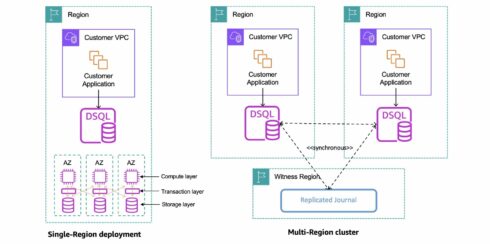
Amazon has announced that Amazon Aurora DSQL is finally generally available after first being introduced as a preview at re:Invent last year.
Aurora DSQL is a serverless distributed SQL database designed for always available applications, featuring capabilities focused on providing scalability, high availability, and zero infrastructure management. Specifically, Amazon claims 99.99% availability in a single region and 99.999% availability across multiple regions.
In single region configurations, Aurora DSQL commits all write transactions to a distributed transaction log and replicates all committed log data to user storage replicas across three Availability Zones. By distributing storage replicas, Aurora DSQL is able to ensure optimal read performance.
Multi-region clusters improve availability further by utilizing a Regional endpoint for each peered cluster Region (two in total). Each of the endpoints present a single logical database and support concurrent read and write operations. A third Region also acts as a log-only witness. According to Amazon, this architecture allows customers to balance and optimize for geographic locations, performance, or resiliency.
“Aurora DSQL is an ideal choice to support applications using microservices and event-driven architectures, and you can design highly scalable solutions for industries such as banking, ecommerce, travel, and retail. It’s also ideal for multi-tenant software as a service (SaaS) applications and data-driven services like payment processing, gaming platforms, and social media applications that require multi-Region scalability and resilience,” Amazon wrote in a blog post.
Aurora DSQL also has an MCP server to enable developers to interact with their database using natural language, enabling tasks such as exploring database schema, understanding table structure, and executing SQL queries.
Since the preview last year, Amazon has also improved the cluster management experience, integrated with more AWS services (AWS Backup, AWS PrivateLink, AWS CloudFormation, and AWS CloudTrail), and added more PostgreSQL features like support for views, unique secondary indexes for tables with existing data, and Auto-Analyze.
Amazon has provided a simple tutorial on how to set up Aurora DSQL in its blog post announcing the release.






